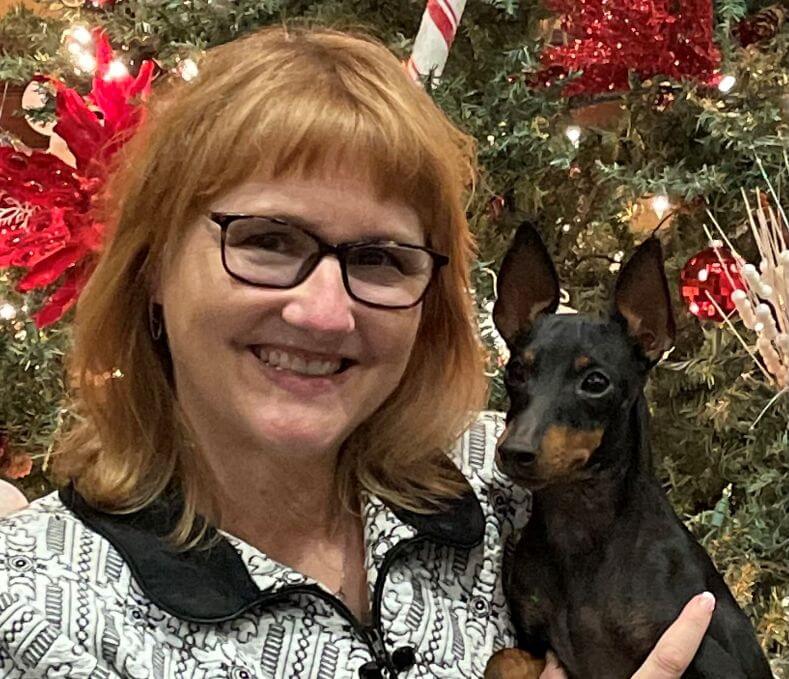Interview with Breeder/Owner Handler Dr. Kat Patrick
1. When were you first introduced to the sport of purebred dogs? To your breed?
Dr. Kat Patrick: Four homeschooled kids and miles of public footpaths in the UK seemed a good equation for adding a dog to the family. Little did I know that my quest for a small, short-haired, athletic breed would lead me to Toy Manchester Terriers. Known as English Toy Terriers in the UK, they are number ten on the vulnerable breeds list in their country of origin, and I thought that if I was lucky enough to find an ETT puppy, I needed to be part of the breed’s preservation. So I decided from the beginning that I’d do whatever it took to raise their public profile and produce quality dogs. That meant learning how to show (and going, even if I was the only entry) because people can’t get to know them if they don’t see them.
2. How many years in dogs? How many as an Owner Handler? As a Breeder?
Dr. Kat Patrick: I brought my first ETT home on New Year’s Eve in 2014. Her first championship show saw her awarded Best Puppy in Breed, and she went on to take third place in her class at Crufts in 2016, qualifying her automatically for the following year. But then we moved back to my home state of Texas where we were for some time before we ventured into the US show scene. It was quite a change of organization, of culture, and of approach, but in 2020 she achieved her Grand Champion status. And this was after she had started her role as Texangals’ foundation bitch, the first litter born right after the 2017 eclipse.
3. Do you attend show handling classes? Have you attended any handling seminars?
Dr. Kat Patrick: We have a fantastic community of dog fanciers in the Austin area and a weekly class on Tuesdays organized by my friend, Jo Lynne York. Afterwards, its margaritas and fajitas at El Mercado. As for seminars, I haven’t done any; COVID put a big damper on a lot of in-person things, so that’s why I have more to say about virtual opportunities, as per the next question.
4. Have you found virtual learning tools to be helpful? Classes? Videos? Websites? Social Media?
Dr. Kat Patrick: Yes! In addition to watching a lot of streaming of my breed from shows in other states and videos from Specialties, I watch Crufts, Royal Canin, and Westminster, just to name a few. I slow things down to really see what different handlers are doing to get the most from their dogs. I have found Leading Edge to have some helpful training videos, and some of Eric Salas’ YouTube seminars and DVDs about Puppy Culture to start everything off on the right “paw.” But I am always looking for other ideas, because nobody is perfect or has all the answers. One thing is for sure, though: It always looks easier on the videos than it is in practice!
As for social media in general, I think it’s a lifeline for breeders particularly. The wealth of experience and practical help—sometimes at a moment of crisis—is a real boon. They don’t replace vets, obviously, but they can share photos of their whelping set-ups, make suggestions for potty-training options like real grass or pellets, and discuss problems and solutions for all kinds of minutiae, including ideas for getting a pregnant bitch to eat when she’s not inclined to!
5. Do you compete in the National Owner-Handled Series? Are rankings important to you?
Dr. Kat Patrick: Yes, and I am starting to echo a growing sentiment that clubs which don’t offer NOHS Groups or give only flat ribbons for NOHS Group placements are doing a disservice to the “bread and butter” of the dog fancy. I really love running into the same owners in NOHS Group, and getting to know their dogs and their breeding programs. We connect on social media and share things we’ve learned or techniques we’ve tried, and we celebrate each other’s successes. I can’t deny that the new levels of NOHS achievement are a real boon for goal-setting, and I just had my first bred-by puppy reach the Bronze level this past week. I’m hoping we get invited to Orlando this year, so we’ve still got a lot of work to do till then.
6. How important is the Bred-By Class to you? How important are Specialties?
Dr. Kat Patrick: I think winning the Bred-By Class is one of the best feelings, and even more so when you go on to win Bred-By Best in Show as I did with my puppy, GCH Texangals Killing Time, at Dallas last year. This is validation about your breeding program, that you’re not just producing a good specimen of your breed, but that it’s being recognized as one among all the other breeds. Kudos to the Lexington show and others like it that have Bred-By Groups and allow Specials to compete for Best of Breed Bred-By-Exhibitor. It’s damn hard work to breed good puppies, a process that starts many years earlier and requires learning, planning, proving, testing, and a lot of nights on a mattress next to the whelping box.
This is validation about your breeding program, that you’re not just producing a good specimen of your breed, but that it’s being recognized as one among all the other breeds.
As for Specialties, in a low-number breed like Toy Manchesters, it’s only at Specialties that you get appreciable numbers gathered in one place. Most of us use them as an opportunity to stud shop, seeing the males in person that are otherwise just names. I video all the dogs and learn more about trends in conformation and where perhaps I need to concentrate on shoring up things in my breeding program. I meet up with other owners and breeders from around the country to discuss the state of the breed, the worries, and the opportunities. What’s more, this is where you get to honor your brood bitches, your stud dogs, and your veterans in their special classes, and showcase a good crop of puppies in Sweeps.
Breeder Brag: My foundation bitch won Brood Bitch at last year’s national in Kalamazoo, and her grandson was Best Puppy in Variety at a Regional Specialty over Easter this year. As one of the newer breeders on the block, these were very affirming accolades!
7. Is it a challenge to compete with your breed(s) as a Breeder/Owner Handler?
Dr. Kat Patrick: I think it’s hard to compete in Groups with Toy Manchester Terriers in general, just because they are usually just a small, sleek, black dog among a sea of flowing hair. They were built to work in the shadows, killing rats in the dark corners of firelit taverns, so I’m not surprised when they get overlooked. Saying that, there are a few of us this year who are getting regularly recognized in the NOHS Group ring, and a few are even making big splashes in the regular ring, albeit presented by Professional Handlers. My dream is to see a Toy Manchester as NOHS BIS and a Standard as Reserve, putting the spotlight on those lean, gracile bodies with alert expressions and oodles of impish personality.
8. Are you intimidated by the Professional Handlers? By the Judges?
Dr. Kat Patrick: I’m not intimidated, but I appreciate Handlers who are friendly and show good sportsmanship. And I’m very appreciative of those whose handler organizations work so tirelessly behind the scenes, like the Southern Handlers Charity League which
prepares some of the show sites in Texas despite the snow, ice, searing heat, or pelting rain.
As for Judges, there are two kinds that are memorable to me. The first are those who watch other rings when judging the breed or who turn their back before I’ve even gotten into the Group ring. I already feel a little bit like the little black dog is overlooked and undervalued, so this doesn’t help my thoughts on that. Then there are those who are memorable for a good reason, those who say something that goes into my treasure trove of learning opportunities. It doesn’t even always have to be “nice.” Sure, I love it when a judge says they were looking for personality in expression and saw it in my girl, but I also appreciate one who says I could show the bite better.
9. Who have been your mentor(s) as an Owner Handler? As a Breeder?
A good mentor is crucial as a font of knowledge, experience, guidance, and careful nurturing of the Breed Standard for making better dogs.
Dr. Kat Patrick: I’m a bit of a sponge for information, so I have quite a large group of people whose brains I pick. But if I were to name someone who has inspired me as an Owner Handler, it would
probably be my friend, Jan Hendrix, who had the No. 1 Owner-Handled Toy Manchester for two years in a row. She has sadly turned away from “the dark side” and has gotten herself a Whippet, but she always presented “Bentley” so well and was a great travel companion.
My list for Breeder mentors is much longer, starting with those in the UK who launched my desire to “join the ETT team,” especially Sharon Adams who co-bred my foundation bitch. She was the ETT club’s Health Chair for a time and is a font of information that I still dip into regularly via Messenger, sometimes at two in the morning GMT!
While I’ll mention a few who have contributed more than they probably know—people like Roger Chagas, Annette Bujold, Barbie Munafo, Barbara Woods, and Charles & Debbie Williams—my biggest cheerleader and confidante for everything related to Toy Manchester Terriers is Patricia Hall of Poricias Kennels in Pennsylvania.
I knew about Pat from the kennel name of an ETT whom I competed against in the UK. Then, after I moved to Texas and started breeding, she ended up asking if I had any available girls when she lost her “heart dog.” Soon, Texangals Theodora Ted Logan (now CHAMPION Texangals Theodora Ted Logan after she finished at the Regional Specialty last month) was heading north and has since wheedled her way into Pat’s heart.
And Pat is now firmly in mine! We are co-breeding a couple of litters this year, especially a repeat-breeding that produced my “Katie” and her four champion littermates. (Put this into context: There were six in the litter, and five finished—something we’re very proud of.)
A good mentor is crucial as a font of knowledge, experience, guidance, and careful nurturing of the Breed Standard for making better dogs.
10. How important is the Breeder/Owner Handler to the future of the dog sport?
Dr. Kat Patrick: I’m often leery of people who breed and don’t show at least occasionally, especially in Manchesters since there are so few puppies born in the first place (under 200 of both varieties in 2020). We need every show-quality dog to turn up—it’s a team effort to keep up their public profile, and the more interaction we have with each other, the better we can work toward eliminating problems and capitalizing on strengths. Of course, some breeders won’t be physically able to take a dog into the ring, but in general, the Manchester community is supportive and will help out by presenting a dog for them.
In terms of Owner Handlers, I’d hate to think that we’re all just the “mugs” who make up the numbers so that the professionals have other dogs to beat. We do have a responsibility to work at our craft so that our lovely dogs are presented in a way that shows off their qualities, but equally, every dog deserves fair consideration against the published Standards. It’s the Breeder/Owner Handler who is attending a show for feedback and information for now and for the future, not just for ribbons and awards, and what they take away from it goes into the pot of decision-making for the next litter, the next line, and the next pathway for their breeding program. How can this be anything but fundamental to the future of dog sport?
11. What are your goals as an Owner Handler? As a Breeder? Is there a milestone that has eluded you?
Dr. Kat Patrick: Goals for a Breeder are very interesting. Successes come not just from the dogs and puppies that have stayed home, but also from those that have gone to other homes. My focus right now is on the youngest Texangals show puppy, Texangals DJ Carpe Diem, who is just entering the show ring with his new Owner Handler. He already won the Group as a Beginner Puppy, so I’m very hopeful of his success in the ring and, as he gets older, in Performance events.
As an Owner Handler, I think I will have achieved two goals by the time this issue comes out; both the Bronze level of Grand Championship and of NOHS for Katie. So far, a NOHS BIS has eluded me. That would be an honor that would mean a lot to me, my breeding program, and the breed as a whole—taking the little black dog out of the shadows and into the limelight!
12. Is there a funny story that you can share about your experiences as a Breeder/Owner Handler?
Dr. Kat Patrick: Breeders will have different ways of deciding the names of their puppies. One friend is quite methodical, starting with “A” for the first litter, then “B”, etc. Another friend names all of her Manchesters after whiskey brands. Some will let the new owners name them, but for better or worse, my litters are named by my teenagers.
You can see where this is going.
We’ve had a Monty Python and the Holy Grail litter, and a Bill and Ted’s Excellent Adventure, JoJo’s Bizarre Adventure, Superman, and Umbrella Academy litters, to name a few. Sometimes this results in girl puppies being given boys’ names. (We’ve had a Dennis, a Ted, and a Five, for example.) Right now, the kids are lobbying me to name my current litter Oingo, Boingo, and Brothers—a line from an anime song.
Lord, give me strength! (Breeders seem to say this a lot.)









